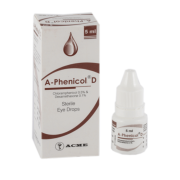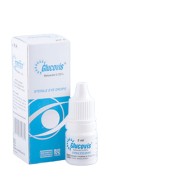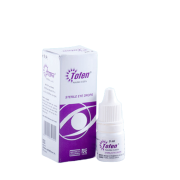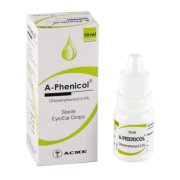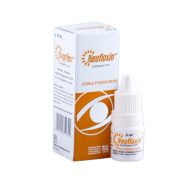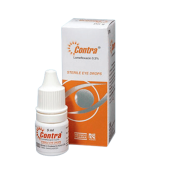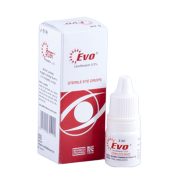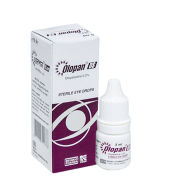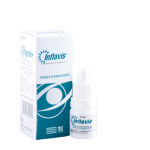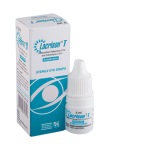Lacrison
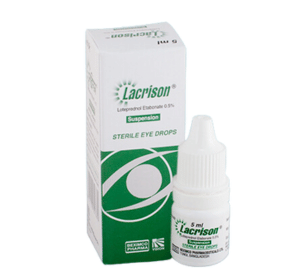
Generic Name: Loteprednol etabonate 0.5%
Dosage Form: Ophthalmic suspension
TG Name: Eye Care
What Lacrison® is and what it is used for?
Lacrison® is the preparation of Loteprednol etabonate which is belongs to a group of medicines known as steroidal anti-inflammatory drugs. Lacrison® is used to treat inflammation of the eye, after surgery.
It acts by reducing inflammation and eases the symptoms. Because it is used in low doses directly where it is needed, its action is only at this place.
Before you take Lacrison®?
Do not take this medicine and tell your doctor if:
- If you are allergic to the active substance (loteprednol) or any of the other ingredients of this medicine
- If you have been allergic to any other corticosteroid
- If you have eye diseases caused by viruses such as herpes simplex, vaccinia, and varicella
- If you have eye diseases caused by mycobacterium and fungi
- If you are breast-feeding
Take special care with Lacrison®
Check with your doctor before taking this medicine if you suffer from, or have in the past suffered from:
- Tell your doctor if you already have glaucoma
- Tell your doctor if pain develops, or if redness, itching, or inflammation gets worse
- See your doctor if your symptoms do not get better within 2 days. He/she may want to re-evaluate your condition
- You should not use this medicine longer than 10 days without having the pressure in your eye checked by your doctor
- Long-term use of Loteprednol or other eye drops that contain steroids, may result in glaucoma or raised pressure in the eye, which can cause damage to the optic nerve, problems with vision, and cataracts
- Long-term use of this medicine or other eye drops that contain steroids, may lower your ability to fight infections and may increase your chance of getting an eye infection including herpes simplex
- Using steroid eye drops like medicine may make viral diseases of the eye worse and last longer
Taking other medicines
Tell your doctor or pharmacist if you are taking or have recently taken any other medicines, including medicines obtained without a prescription. Especially, tell you doctor if you use:
- medicines known as anticholinergics (used to treat a variety of conditions, e.g. gastrointestinal cramps, muscular spasms, urge incontinence or asthma)
- eye drops for the treatment of high pressure in the eye.
Pregnancy and breast-feeding
If you are pregnant or breast-feeding, think you may be pregnant or are planning to have a baby, ask your doctor or pharmacist for advice before taking this medicine. It is possible that you may still receive Loteprednol, but it is also possible that an alternative may be used. Loteprednol should not be used when breast-feeding.
How to take Lacrison® (Administration)?
Always use this medicine exactly as your doctor has told you. Check with your doctor or pharmacist if you are not sure.
How much to take?
The recommended dose for adults and elderly is 1 to 2 drops four times daily. Treatment with Lacrison® normally begins 24 hours after surgery and continues for two weeks.
If you take more Lacrison® than you should
Putting too many drops in your eye(s) is unlikely to lead to unwanted side effects. Tell your doctor or a pharmacist.
If you forget to take Lacrison®
If you forget to take a dose, take it as soon as you remember it. However, if it is nearly time for the next dose, skip the missed dose. Do not take a double dose to make up for a forgotten dose
If you stop taking Lacrison®
Always use this medicine exactly as your doctor has told you. Do not stop using Lacrison® without speaking to your doctor first. If you have any further questions on the use of this medicine, ask your doctor or pharmacist.
Possible side effects
Like all medicines, this medicine can cause side effects, although not everybody gets them. If you experience any of the following symptoms: redness, itching or swelling of the membrane covering the white part of the eye and/or eyelid(s) or general symptoms such as difficulty breathing, difficulty swallowing, flushing or redness of the face and swelling of the face or tongue you should stop using this medicine and seek immediate medical advice. These could be the signs of severe allergic reaction.
Common side effects (may affect up to 1 in 10 people): Effects in the eye: Corneal defect, eye discharge, ocular discomfort, dry eye, tearing, foreign body sensation in eyes, eye redness, ocular itching, burning sensation at the site of instillation and rise in intra-ocular pressure. General side effects: headache.
Tell your doctor if any of the side effects gets serious or lasts longer than a few days, or if you notice any side effects not listed in this leaflet
How to store?
Keep this medicine out of the sight and reach of children.
Discard the bottle 28 days after opening, even if there is solution remaining.
Do not store above 25°C (room temperature). Do not freeze.


